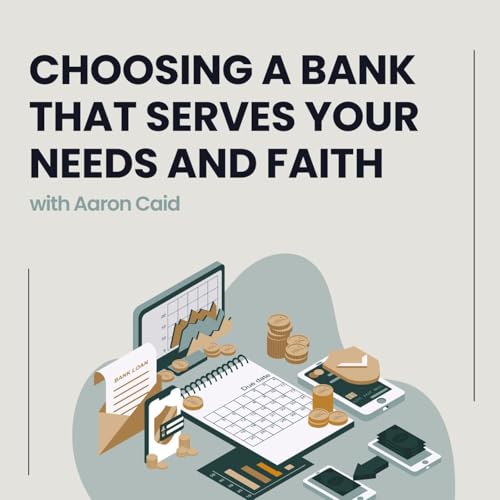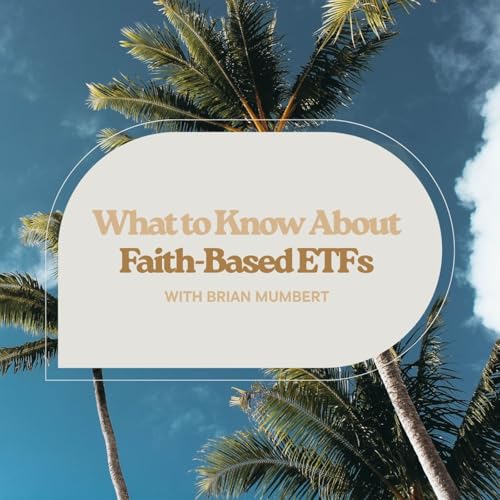Banking isn’t usually the first place we think about living out our faith. Yet for many believers, where we bank is becoming an important part of faithful stewardship. Financial institutions don’t just hold our money—they decide how it’s used, invested, and leveraged for impact.That’s why faith-based banking is gaining attention. It offers Christians an opportunity to align everyday financial decisions with deeper convictions about money, integrity, and service.Today, we sat down with Aaron Caid, Chief Marketing Officer at Christian Community Credit Union (CCCU) and AdelFi, to talk about why believers may want to reconsider where they bank—and what truly matters when evaluating a financial institution.Start With the Basics: Stewardship Still Requires ExcellenceBefore talking about faith alignment, there’s a practical reality we can’t ignore: a bank still needs to do its job well.Good stewardship requires systems that are secure, efficient, and reliable. Strong digital tools, responsive customer service, and clear processes aren’t luxuries—they’re necessities. A banking partner should simplify your financial life, not complicate it with friction, confusion, or outdated technology. In other words, expecting excellence from your bank isn’t selfish. It’s wise.Once the basics are covered, a deeper question emerges: Does this institution share your values?Every bank makes decisions about how money is used and where it’s invested. Those choices reflect a worldview—whether explicit or not. Faith-aligned banking starts from a biblical understanding of stewardship, integrity, and service, recognizing that money is a tool entrusted by God, not an end in itself.Where we bank, then, quietly reflects what we believe about the purpose of money.Faith That Shows Up in ActionOne of the distinctives of organizations like Christian Community Credit Union (CCCU) and AdelFi is that faith doesn’t remain a mission statement—it’s lived out through tangible generosity.Collectively, these organizations have more than 125 years of supporting Christian ministries, missionaries, church-planting efforts, and disaster relief. Together, they’ve given millions of dollars toward Christ-centered work around the world.Their impact goes beyond large-scale initiatives. Recent efforts include:Supporting financial discipleship resources for married couples, addressing one of the leading contributors to marital stress and divorce.Partnering with members to contribute over $10,000 to Operation Christmas Child, serving children in need, and sharing the love of Christ.Investing earnings back into members through better rates and lower fees—while also tithing corporately to support gospel work.This is what it looks like when banking becomes a shared mission rather than a purely transactional relationship.Red Flags That May Signal It’s Time to Reconsider Your BankRegardless of where you bank today, there are warning signs that may indicate your institution isn’t serving you—or your values—well:Unclear or high fees that quietly erode your savingsOutdated technology that complicates everyday money managementPoor access to real people when problems ariseBusiness practices or investments that conflict with your Christian convictionsFeeling like a number, rather than a valued customerThese issues don’t just affect convenience—they affect stewardship.What the AdelFi Transition Means for MembersWith the merger of Christian Community Credit Union and AdelFi, members are already seeing expanded services, greater reach, and enhanced capabilities. The combined organization will soon operate under the AdelFi Christian Banking brand, positioning it as the largest Christian banking solution of its kind.The goal is simple: better serve individuals, families, churches, ministries, and Christian-owned businesses—while amplifying Kingdom impact.When financial services function well and align with your faith, your money can serve both your everyday needs and God’s Kingdom purposes.As a special opportunity for Faith & Finance listeners, you can earn up to a $400 bonus when opening a qualifying high-yield checking or savings account—or a Visa cash back card.Visit FaithFi.com/Banking and enter code “FAITHFI” to learn more.On Today’s Program, Rob Answers Listener Questions:I’ve heard that Social Security limits how much you can have in savings—$2,000 for singles and $3,000 for couples—or you could lose benefits. Is that true?I’m 66 and will soon qualify for full Social Security, but I plan to keep working. I have about $45,000 in savings and am hesitant to invest it in the stock market given current market conditions. What should I do with that money?I want to honor God through generosity, but I give so much that my account sometimes goes negative. I still want to help people in need, but I know I need more wisdom and self-control. How can I balance generosity with saving, and are there any resources...
Más
Menos
 Feb 13 202625 m
Feb 13 202625 m 25 m
25 m Feb 11 202625 m
Feb 11 202625 m 25 m
25 m 25 m
25 m 25 m
25 m 25 m
25 m 25 m
25 m
